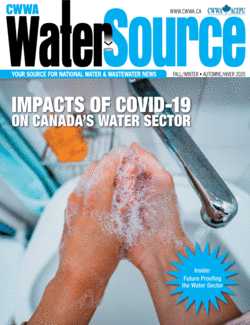RESOURCES
Climate Knowledge Series
Reports and Fact Sheets
E-Bulletin
Water Source Magazine
Climate Change Knowledge Series
Actions for Climate Resiliency
Climate risk assessments give municipal infrastructure and asset
management practitioners a systematic way of identifying and
communicating vulnerabilities, the likelihood of future climate hazards,
and their potential impacts for municipal infrastructure and the
communities they serve.
For those municipalities who are more advanced with incorporating
climate change considerations, risk assessments can also be used as
input to communicate / demonstrate that the municipalities plans,
strategies, practices, etc. are dealing with the important risks.
CWWA Reports and Fact Sheets
Fluoride in Drinking Water - Fact Sheet and Speaking Notes
Fact Sheet – Summer 2025
Municipalities across Canada decide whether or not to add fluoride to the drinking water supply delivered to their residents. It is a decision to be made by the municipal council, or by a provincial/territorial health authority. This decision is made with direction from the local health authority and following extensive public engagement. This is not a decision made by the utility and is not part of the required process to meet regulations for safe drinking water. It is added post-treatment, in accordance with strict regulations, to provide community-wide dental benefits. The municipal council may also consider the water treatment plant operational, maintenance and cost implications of adding fluoride.
The purpose of this CWWA Fact Sheet and Speaking Notes is to help municipal water officials brief their Councils and other stakeholders on the topic of fluoridation of drinking water. While there is much information available on the internet, CWWA believes that the sources we cite in this sheet are credible sources of science-based information and should be considered.
PFAS/PFOS in Drinking Water(Per- and Polyfluoroalkylated Substances)
Fact Sheet – Updated Spring 2025
There has been growing interest and concern in the drinking water industry in North America over a group of compounds called Per- and Polyfluoroalkylated Substances or PFAS. This fact sheet was prepared by the CWWA Drinking Water Quality Committee and is intended to provide general high level information to CWWA members, while also referencing more detailed sources of information that will help members and their associated utilities prepare their own responses to questions about PFAS compounds they may encounter from their customers, municipal leaders, political leaders, media, and other concerned stakeholders.
Adoption of natural infrastructure in the water sector
“Adoption of Natural Infrastructure in the Water Sector” is a CWWA report based on a survey of its members in 2023. The survey of 60 questions was carried out between January 27, 2023 and February 28, 2023. The results were collected and analyzed by CWWA’s Utility Leadership Committee and Climate Change Committee.
Facts and Speaking notes - Asbestos-Cement Water Pipes
Water utilities have transitioned through many different materials used for water conveyance pipes over many, many years. One material, used for a brief period in Canada during the 1940’s through to the 1960’s, was cement containing asbestos. This asbestos-cement (A-C) pipe is no longer installed and has not been installed in municipal water systems for over 50 years. While there is not an aggressive plan to seek out and remove A-C pipe, it is recommended, and is a generally accepted practice, that A-C pipe be removed and replaced during any construction that exposes such pipe.
PFAS Strategic Roadmap: EPA's Commitments to Action 2021-2024
Looking for more information on PFAS? Read the PFAS Strategic Roadmap: EPA’s Commitments to Action 2021-2024
Symposium: Global lessons for safe drinking water through quality management
Webinar
Over two decades ago, an international consensus emerged that true drinking water safety is based on the quality of the systems that produced and delivered it, and not on a sample of the end produce. To explore these issues CWWA hosted a virtual symposium on the subject of quality management of drinking water supplies and gain valuable insight from international experience on key aspects and approaches to public health protection.
Workforce Development
A Guidance Document
This document has been created by and for water, wastewater and stormwater utility managers — to offer guidance for addressing the challenges of recruiting, training and retaining qualified staff to maintain a resilient and sustainable utility.
Towards a Sustainable Utility - Webinar Series
Watch the Recordings
This webinar series explored the individual aspects of sustainable utilities followed by a final panel discussion that tied together the disparate aspects together, and explored how we balance conflicting priorities to create a sustainable utility.
Towards a Sustainable Utility
A Guidance Document for water, wastewater and stormwater utilities
In developing this Guidance Document, substantial thought has gone into structuring the topics, including laying out challenges, best practices and resources. It also sets out a helpful framework, particularly for those of you just wading into this work toward having a sustainable utility. Even the selected challenges are structured, beginning with the operational aspects within a utility’s domain, moving into global ones related to operations, followed by ones that pertain to taking on a role to influence others.
Lead in Drinking Water
On March 8, 2019, Health Canada released revised guidelines, significantly reducing the maximum allowable concentration of lead in drinking water. While our municipal water sector fully supports these new targets, we need to identify the challenges inherent in moving to these new targets while maintain full public
Best Practices of Optimized Operation in Large Scale Pump Systems
2017 – The Canadian Water and Wastewater Association conducted a national survey on large-scale pumping system optimization. It identifies what products/practices are used, and what drives investment.
Strengthening the Resilience of the Canadian Water Sector - Final Report
2017 – The project goal was to develop and conduct a National Survey of the Water Sector to create a National Risk Profile that can be used collaboratively by CWWA and PSC. A research study has been conducted using quantitative and qualitative methods to assess the state of preparedness of the water sector and make recommendations for concrete measures that can be taken to enhance resilience. The purpose was to identify policies and practices water utilities can adopt in the short and medium term to ensure a safer, more secure and resilient water supply to Canadians.
REPORT: CWWA PUBLIC ATTITUDES PROJECT: CHANGING PUBLIC ATTITUDES ON THE VALUE OF CANADA'S WATER SYSTEM INFRASTRUCTURE (JUNE 2015
2015 – This report is about how we get water and wastewater infrastructure seen as priorities in communities so they might receive an appropriate share of government funding.
CWWA Public Attitudes Project: Roundtable Transcript (June 2015)
2015 – A complete transcript of the facilitated round table discussion with many leading Canadian water experts. The round table was held in June 2014 to coincide with the Canadian Water Summit in Toronto.

CWWA E-Bulletin
Our national newsletter is produced monthly and distributed to over 5,000 water professionals. We share our CWWA activity and relevant water news from across the country.

Water Source Magazine
CWWA’s semi-annual print publication sharing the innovative work of our members. This glossy magazine is also available in electronic format. Members Only.

CWWA is a non-profit national body representing the common interests of Canada’s public sector municipal water and wastewater services and their private sector suppliers and partners.
Head Office
CWWA, Unit 11, 1010 Polytek Street, Ottawa, ON K1J 9H9 Canada
(613) 747-0524
admin@cwwa.ca